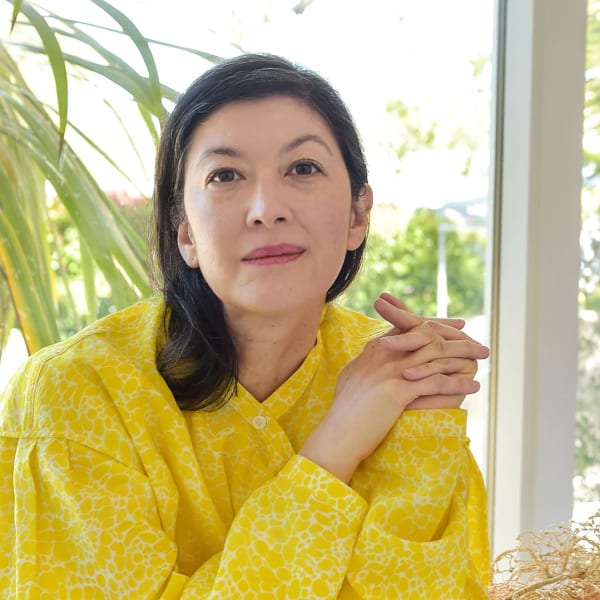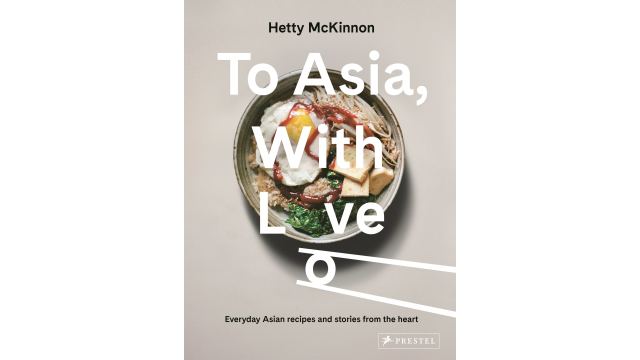Q&A with Hetty McKinnon

Hetty McKinnon is a vegetarian cookbook author and founder of the food magazine Peddler. Currently based in Brooklyn, she’s a native Australian whose Chinese parents immigrated from Guangdong Province to Sydney, where Hetty eventually launched a business called Arthur Street Kitchen, delivering vibrant salads to locals by bicycle.
She has written four books; her most recent cookbook, To Asia, with Love: Everyday Asian Recipes & Stories from the Heart, honors the food and the flavors she grew up eating in Sydney — using plant-based ingredients. “I think there is the perception that Asian food is very meat heavy,” she said, “and while that is the case in some households, for me, it’s exciting and joyous to be able to present really classic flavors and intensely tasty Asian dishes without the need for meat.”
Now her family’s “everyday food is vegetables, legumes, grains, rice. My kids love pasta and carbs, so I guess I must find ways of balancing that. But I have no problems with serving pasta once or twice a week because I always load it up with plenty of vegetables.”
RG Food: We’re big fans of To Asia, With Love. Can you tell us about your approach to traditional Asian dishes?
Hetty: Growing up, we ate a traditional Cantonese banquet for dinner every night — that means a bowl of rice, accompanied by five or six savory dishes in the middle of the table — and those are the dishes which inspire me a lot. But my approach to Asian cooking is very different from my mother’s. I was born in and grew up in Sydney, Australia. I was very much caught between two worlds — the East of my heritage, the West of my present — so this blending of cultures, this amalgamation of influences, has become the way I approach the traditional dishes and flavors of my youth.
Some of the dishes in To Asia, With Love are exactly the way my mother made them, or how she showed me to make them, while others are my interpretation. I always want to inject some of myself into my recipes, and while my heritage is Chinese, I am also Australian. So I think my approach to Asian cooking and cooking in general reflects this. This is why I refer to my recipes as “third-culture cooking” — it is not distinctly Chinese, nor Australian, but a third interpretation that combines both of these influences.
RG Food: Can you describe your kitchen meditation?
Hetty: Honestly, my ultimate kitchen meditation is making dumplings. The repetition, the use of my hands, the time-honored craft, the memories of making dumpling after dumpling with my mother. It brings me a lot of peace and joy to be honoring my cultural heritage and family legacy in this way.
RG Food: What’s nourishing to you, and why?
Hetty: To me, to nourish is to comfort. And one of my ultimate comfort foods is a bowl of jook, warming my hands, soothing me with every mouthful. Jook (or congee) is such a simple dish — made with rice and water, at its core — but it is such comfort food to me because it carries memories of childhood, of eating it alongside my mother. A lot of people say they ate jook when they were feeling poorly, but not me. For us, in our family, making jook was intentional, whether it is to satiate a craving, or to fight the heat (yes my mother made hot jook on hot days, believing that hot foods help our bodies sweat, which naturally helps our bodies cool down).
RG Food: What are some nourishing dishes you cook for your family?
Hetty: I cook a lot of rice these days, so we often enjoy a bowl of rice with a few savory dishes — our family faves on our table are the salt and vinegar potatoes, steamed water egg custard, and mapo tofu from To Asia, With Love. We eat a lot of the noodle dishes from To Asia, With Love too — the spicy tantanmen and cacio e pepe udon are faves. We also love broccoli and chickpea salad from my first book Community, the pasta, potato, and green bean salad from Neighborhood, and the gozleme from Family.
RG Food: What makes you feel confident in the kitchen?
Hetty: In the kitchen, I am always carried and emboldened by memory. As I get older, the techniques, and the wisdom I have learnt, and continue to learn, from my mother are what give me the confidence in the kitchen.
RG Food: You have strong opinions about salad. Tell us about them (and the secret to a great dressing, too).
Hetty: I am passionate about salad. It was the dish that drew me to a career in food! I ran a salad delivery business in Sydney for four years. All my salads were vegetable-based, combined with a legume or grain, perhaps noodles or rice, heavy on herbs, and always topped with a crunchy element like seeds or nuts. For me, a salad has always been a main meal. I don’t cook a lot of “leaf-based” salads because to me, they are not as satisfying as I want a main meal to be.
My salads usually have a cooked element — chargrilled broccoli, roasted cauliflower, roasted sweet potato, barbecued zucchini, or pan-fried turnips for example, which have been accented with spices. I have always cooked salads with flavors from all over the world — for me, it’s an exploration of global flavors and culture.
Salad represents so much to me — it has taught me so much about flavor, about texture, about composition, about culture and most importantly, how food can bring people together.
[The key to a great dressing] is balance … but also so much more. It should have high notes — citrus, vinegar — but also low notes that bring interest and intrigue. I love using spices in my dressings, or umami heavy hitters such as miso or tahini. The dressing brings the “story” to a salad, makes it feel alive, so it is really important to layer those flavors to achieve maximum complexity.
RG Food: What’s your favorite vegetable memory?
Hetty: Many of my childhood memories involve vegetables. My father worked at the produce markets. He filled our house with vegetables and fruits, so it was always a huge part of my life. My mum told me my first word was doong-gu, which is mushroom in Cantonese!
Key Takeaways
- The vegan author on salad versatility.
- McKinnon celebrates third-culture cooking.
- Nourishment is comfort.





